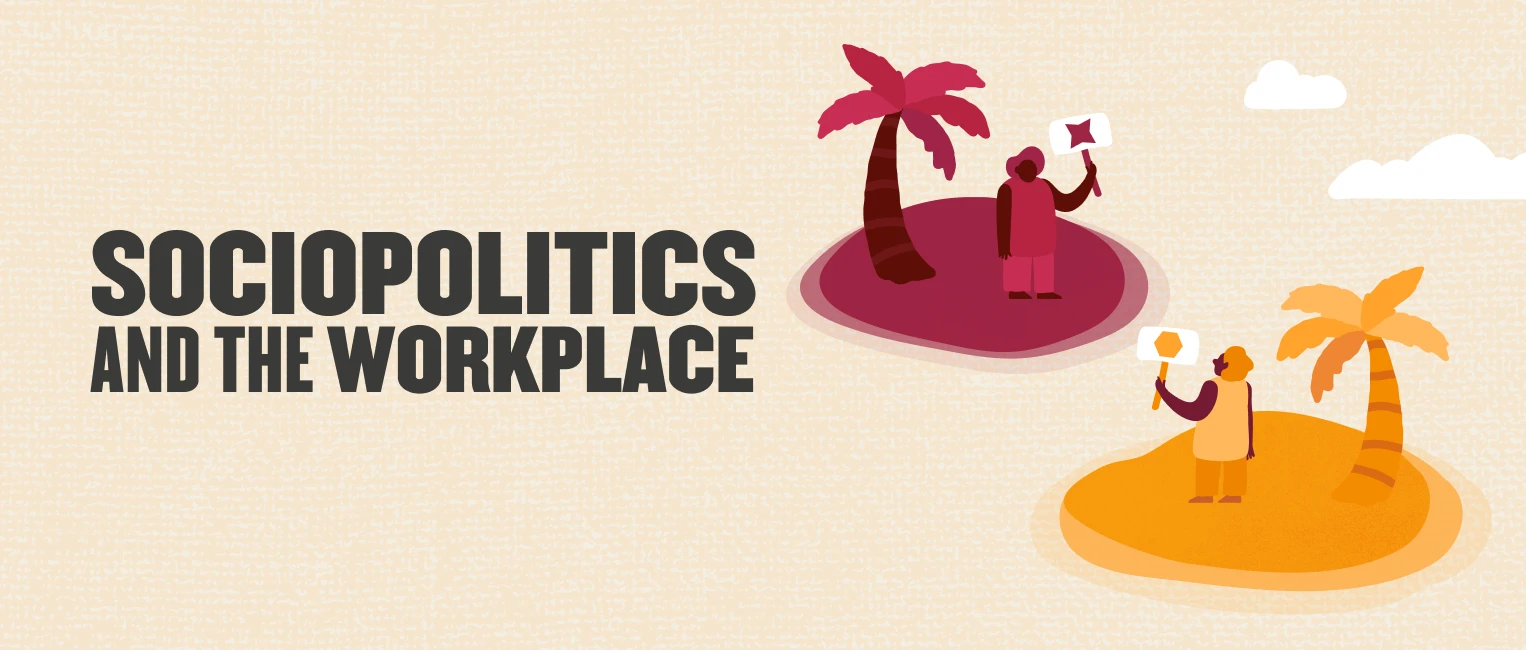If there’s one thing you don’t talk about at family gatherings, it’s social politics. In the past, the same could be said about the workplace. But things have changed.
In a talk by Simon Sinek, he says, “we have to understand, for better or for worse, the changing nature of what work has become in our lives.” Today’s workforce expects the workplace to be where they “get their purpose, friendships, community, and social life.”
It isn’t hard to understand why. We’ve all endured the last three years, and uncertainty about the future is still sky-high. Beginning with the COVID lockdowns and the ensuing social isolation, the lines between work life and personal life became blurred. Things are getting more complex.
Political discourse doesn’t even have to happen at work to affect relationships in the workplace. People can be avid political activists, attend protests, and take a stand on issues outside of work hours. They can post about these activities and their viewpoints on their personal social channels, like Facebook, TikTok, Twitter, Instagram, and even LinkedIn.
Today’s professionals, especially Millennials and Gen Z, put their whole selves out there, in public. They share everything about their lives and work experiences on social media for everyone and anyone to see. For these new generations of professionals, work lives and personal lives are often mixed, and everything is blended: Where voicing personal opinions on politics or even talking about life outside of work is taboo for older generations, Millennials and Gen Z aren’t shy about speaking up.
But, is speaking about sensitive issues appropriate at work? Is there a specific time and place? How can companies toe the line between empowering people to voice their opinions and bring their authentic selves to work–and offending those who disagree? How can we continue to celebrate diversity and run successful DEI&B programs without silencing some and seeming to favor others?
The challenge for business leaders today is all about finding a balance and coming to the right decision for their people and their company. But what is “right”?
In January 2023, HiBob’s research department asked 5,000 professionals around the world (1,000 in Australia, 2,000 in the United Kingdom, and 2,000 in the United States) about their stances on this important global issue.
When asked if respectful sociopolitical discourse should be encouraged in order to nurture a legitimately inclusive and diverse company culture, 40 percent of Australians agreed. Comparatively, 53 and 52 percent of those in the UK and US agreed, respectively. 30 percent of Australians disagreed compared to 16 percent of those in the UK and 22 percent of those in the US. In Australia and the UK, 31 percent of respondents didn’t have an opinion versus 26 percent in the US.
If we focus only on respondents with an opinion, the data gets even more interesting: Of those with an opinion, 57 percent agree in Australia, 70 percent agree in the US, and 77 percent agree in the UK.
When we asked about keeping sociopolitical discussions out of social media channels like LinkedIn, Medium, and Twitter, 57 percent of US respondents agreed versus 47 percent in the UK and only 39 percent in Australia.
As company leaders, the key is to ensure that political discourse in our workplaces remains healthy and civil. Let’s dive into what it takes to build a company policy that encourages open dialogue and promotes a healthy company culture that celebrates diversity in all its forms.
Talking politics is a recipe for tension
Like politics at the family dinner table, voicing personal opinions at work can get heated. You never know who you might offend. Tension can build between teammates, employees and managers, and companies and customers.
It can cause people to avoid or even confront each other. Things can get uncomfortable. But, the most pressing issue here is that politically heated conversations can harm people’s ability and willingness to work cooperatively and effectively.
According to the HiBob data mentioned earlier, 52 percent of US respondents said that sharing their political opinions with colleagues could harm their relationship with them and negatively affect team productivity. In Australia, 38 percent agreed, and 45 percent agreed in the UK.
Negative sentiment between individuals can destroy a carefully built, healthy company culture if people feel threatened by their co-workers and managers due to political dissonance. At best, this can disrupt productivity and cause people to resign. At worst, it may cause customers to leave.
Can free speech exist in the workplace?
We must understand that a topic that’s “just politics” for one person can be another person’s life situation. People can get emotional, and that’s ok. There’s also no way to prevent these conversations from happening.
Take, for example, the debates surrounding the ending of Roe v. Wade and abortion; LGBTQ laws; the war in Ukraine; or the importance of celebrating Black History Month, and the criticality of affirmative action laws.
Ignoring the world around us isn’t the answer. Empowering your people to feel comfortable speaking openly at work is the key to fostering a healthy company culture where everyone feels heard and motivated.
As business leaders in the modern world, it’s imperative that we tackle this issue and build a solid company policy that preserves our values, respects differences of opinion, and celebrates diversity. It comes down to how we approach free speech.
To put it simply: Free speech can exist in the workplace. But free speech does not equal hate speech.
Creating a culture of inclusiveness and tolerance
First and foremost, company leadership must make it clear that while they encourage the free expression of opinions, any conversation involving sensitive topics must be conducted civilly, with empathy, respect, and an open mind.
Consider bringing in professionals to train management and company leadership in dialogic and active listening. This can help people express differences of opinion without being disrespectful or making others uncomfortable.
Active listening and tolerance must both start at the top. As leaders, we must embody these values: It’s ok to disagree with colleagues and even with the CEO, investors, and management. After all, diversity of thought is fundamental to thinking out of the box and driving the business forward. But, any messages, spoken or written, that promote violence or shaming of others are intolerable.
To ensure everyone understands these values, it is critical to create a code of conduct outlining them and how the work culture reflects them. It’s also essential to make it clear that anyone who doesn’t embody these values may be reprimanded or asked to leave.
Set your values in stone with a company code of conduct
According to the HiBob data, 43 percent of respondents in the US said that a company’s political stance that opposes their own would deter them from accepting an offer to join. In the UK and Australia, 38 and 37 percent of respondents agreed, respectively.
A company’s values are top of mind for today’s professionals and misaligned values can cost companies in talent. Setting your values and company code of conduct down on paper is a great way to showcase to your employees and customers exactly what you stand for and who will make a good culture fit.
When it comes to drafting your code of conduct, use your resources. If you have a culture committee, recruit its members to help.
The aim is to provide guidelines for your people on listening and communicating respectfully.
What should you include in your code of conduct?
Great codes of conduct that support diverse and inclusive cultures of belonging include the following policies:
- Equal opportunity employment
- Anti-harassment and violence
- Anti-retaliation
- Safety policy for physical and mental health
- Standard operational practices for your business
- Confidentiality
- Disciplinary action and violation reporting
- Whistleblowing
- The option to opt out of discussions that may make certain people uncomfortable
In short, successful codes of conduct emphasize the importance of empathy, listening, and practicing tolerance.
Recommended For Further Reading
Company leadership can take a stand
As business leaders in the modern world of work, how we say and write something is just as important as what we say. It requires thought and effort. And while it’s important for us to express our opinions in a way that avoids making people uncomfortable, it’s also important for us to take a stand on important issues and stick up for our values publicly.
Conversations about political issues can alienate employees and even customers. Outbursts, emotionally-charged arguments, and heated debates can destroy the inclusive and accepting organizational culture you’ve worked so hard to build and maintain.
Taking a stand as a company is also important in today’s world: It can attract more customers and talent from around the world who feel a sense of camaraderie with your stance. It’s also a way to ensure the people who join your company are the right culture fit and will help nurture and uphold your values as a business.
So, what’s the bottom line? Keep conversations authentic and respectful in the workplace.
Empowering people to voice their opinions at work comfortably is key to propelling a thriving culture of diversity, inclusion, and belonging forward. As leaders in the modern business world, we are role models. It’s our responsibility to do what we say: Support free and balanced speech in the workplace while giving our people the tools and training to keep it civil, calm, and courteous.

From Ronni Zehavi
Ronni has over 25 years of experience in multinational, hi-tech companies. Prior to setting up HiBob, he was an Entrepreneur in Residence at the Silicon Valley based Bessemer Venture Partners. He's the strategic advisor and co-founder of Team8 Cyber Security and CEO of Cotendo, a content delivery network which was acquired by Akamai for $300m.

